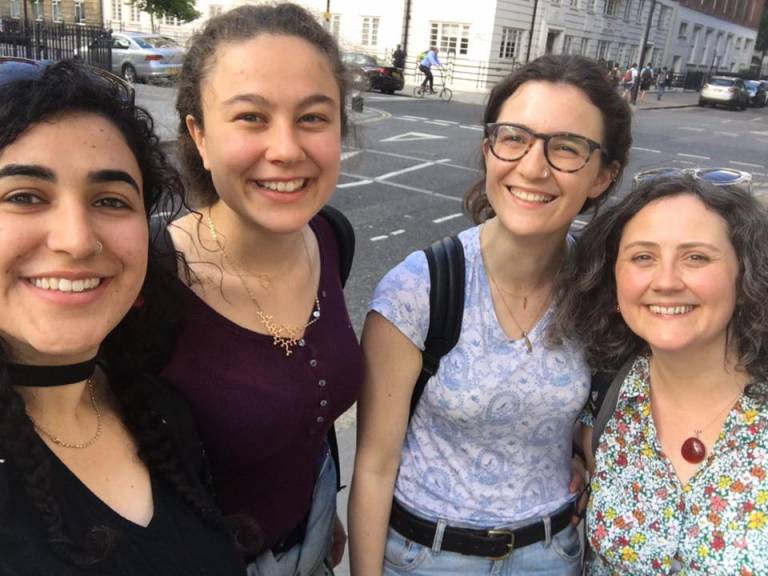Undergraduates use interpretivist research methods to make podcasts about being Jewish at UCL
With a small grant from Liberating the Curriculum, the project has created outputs that are a valuable resource for personal tutors

10 January 2018
A team of undergraduate students have produced a podcast series about the experiences of Jewish people at UCL.
In creating this valuable resource for personal tutors and the broader UCL community, the project also developed the research skills of the students and gave valuable insights to the teaching fellow who instigated it.
A response to antisemitism
Laura Katan, Sarai Keestra, Manya Eversley worked with Cathy Elliott, Senior Teaching Fellow in UCL Political Science, to find out more about experiences of being Jewish at UCL, in the context of a significant increase in anti-Semitic hate crime in the UK between 2010 and 2015. The project received a small Liberating the Curriculum grant from the UCL Arena Centre for Research-based Education.
In the introduction to the JewCL podcast series, the team writes: ‘We are concerned that antisemitism may be leading to painful experiences for Jewish staff and students, leading to distress as well as exclusions and (as importantly) self-exclusions from political and educational activity on campus. [Our research uses] interpretivist research methods to elicit stories and narratives which will feed into resources for personal tutors including guidance and challenging scenarios.’
How they reflected UCL's Connected Curriculum
The project reflected four of the six dimensions of the Connected Curriculum, UCL’s framework for learning through research and enquiry:
- connecting students with researchers and the institution’s research;
- students making connections across subjects and out in to the world;
- students producing outputs directed at an audience;
- students connecting with each other, across phases.
The four-month project also developed their teamwork, project management and communication skills. The students were extremely positive about the project, both process and content. They said: 'We are particularly keen for personal tutors to listen to the podcast, especially Episode 5: What I Wish My Teacher Wouldn't Do.'
Cathy Elliott says: ‘I thoroughly enjoyed working together with students to produce and disseminate our own research. We all learned so much without any assessment to motivate us. The whole project was a testament to how much students can achieve when we trust them as co-researchers and make time and space for them to participate in real research projects.’
What did the team learn?
About pedagogy
- the teaching method was so intertwined with the learning and doing process – it was a very successful way of teaching.
- it’s the teacher’s responsibility to empower the students – we’ve found this project to be incredibly empowering.
About research
- we actually got the opportunity to get practical experience of research – you learn so much more.
- in interpretivist research, stories are co-created. The idea is to be reflexive, where you learn as much about yourself as you do about your interviewee.
- we had long discussions about what qualitative research is and what the best way would be to use it to capture unique human experiences that normally get lost in large scale quantitative research
About outputs
- they can be messy – a podcast can’t be perfect – with clumsy phrasing in interviews, controversial exchange of views and so on. It is a challenge to accept these flaws.
- by listening to and telling the stories of fellow students, we learned to tell our own stories and locate the ways in which we are embedded in flows of power and resistance, oppression and privilege, thought and feeling
- now we are sending out our podcast in the world and I am looking forward to hearing the responses and criticisms. It ain’t over yet!
About interviewing
- it’s a real skill to listen to someone and at the same time to think of a further question.
- avoid jeopardising the quality of the interview by not allowing your own opinions to come to the fore.
- instead of focusing on facts I learned to appreciate emotions, personal observations and let the personal experience speak
- initially I was quite skeptical about the use of interviews to gain data. Trained as a scientist I didn’t see how talking to people for an hour in a relatively unstructured interview would lead us to anything tangible that we could call results. Turns out I was completely wrong.
About the skills they developed
…the skills I learned are definitely going to help me in the future. I am talking to someone at LSHTM about joining a research project on antimicrobial resistance [using] interviews with ‘normal citizens’ to understand the ideas and beliefs people have surrounding antibiotics. My interviewer was very impressed and enthusiastic that I had done research using qualitative methods before. Furthermore I think the listening skills I got from this project will be very important for my future career as I am considering pursuing a career in medicine in which properly listening to a patient is vital on the road to recovery from illness.
Pictured (l to r): Laura Katan, Sarai Keestra, Manya Eversley with Cathy Elliott, Senior Teaching Fellow,UCL Political Science
Listen to the JewCL podcast series (on Apple)
In Episode 5: What I Wish My Teacher Wouldn't Do, the team talks about some of the things Jewish students wish their teachers wouldn't do and why most teachers will never get to hear about it.
In Episode 7: The Jewcy Bits, the team talks about the research approach.
 Close
Close

